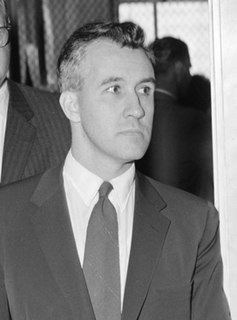A Quote by Dean Koontz
Vladimir Nabokov said the two great evils of the 20th century were Marx and Freud. He was absolutely correct.
Related Quotes
The two most far-reaching critical theories at the beginning of the latest phase of industrial society were those of Marx and Freud. Marx showed the moving powers and the conflicts in the social-historical process. Freud aimed at the critical uncovering of the inner conflicts. Both worked for the liberation of man, even though Marx's concept was more comprehensive and less time-bound than Freud's.
I was really interested in 20th century communalism and alternative communities, the boom of communes in the 60s and 70s. That led me back to the 19th century. I was shocked to find what I would describe as far more utopian ideas in the 19th century than in the 20th century. Not only were the ideas so extreme, but surprising people were adopting them.
For two generations up through the mid-1980s, many thought we were losing the Cold War, even in early 1989, few believed that Poland`s solidarity movement could win, that the Iron Curtain would come down, that the Baltic states could be free, that the second of the 20th century`s great evils, communism, could be vanquished without war, but it happened and the West`s great institutions, NATO and the E.U., grew to embrace 100 million liberated Europeans.
With a few exceptions like Kraftwerk, most great 20th century Western music is in some way American-based. And the great paradox of America, the paradox that distills America, is that this greatest of American contributions to humanity, this American contribution that probably has influenced more people around the world for the good, that probably has brought more people around the world unqualified joy, was born of America's greatest evil, slavery. Or one of the two great evils anyway, counting the European extinction of those who were on the continent first.
To equate Vladimir Putin and the United States of America, as Donald Trump was asked, you know, I guess it was Bill O'Reilly who said, "But Putin is a killer." And he basically said, "So are we." That moral equivalency is a contradiction of everything the United States has ever stood for in the 20th and 21st century.
Darwin, Marx, and Freud meet. They may have understood other things, but the human soul, and in particular the soul of Culture-man, they did not understand. Systems like theirs are only historical curiosities to the 20th century, unless they happen to claim to be appropriate descriptions of Reality. Anyone who believes in these antiquated fantasies stamps himself as ludicrous, posthumous, ineffective, and superfluous. No leading men of the coming decades will be Darwinians, Marxians or Freudians.
Of course, both [Oscar] Wilde & [Vladimir] Nabokov believe in many things, and these things emerge in their writing clearly - for Wilde, the folly of humankind and the (romantic) grandeur of the heroic, lone individual (not unlike Wilde himself); for Nabokov, the possibility of a kind of transcendence through a great, prevailing, superior sort of love (especially in Ada, the most self-congratulatory of novels.)
Darwin's theory of evolution is the last of the great nineteenth-century mystery religions. And as we speak it is now following Freudians and Marxism into the Nether regions, and I'm quite sure that Freud, Marx and Darwin are commiserating one with the other in the dark dungeon where discarded gods gather.
I think that poets can say, "What we want is for everybody on earth to wake up free from fear and with access to medicine and clean water and education." But I don't think poets have any special insight on how to get there. And the 20th century is a pretty good record of that because so many of the great poets were Stalinists: Vallejo, Neruda, Eluard, Aragon, etc. They wrote their odes to Lenin and Stalin. They glorified some of the most violent and grotesque dictatorships of the 20th century. And a lot of the ones who were not Stalinists were fascists or fascist sympathizers.



































